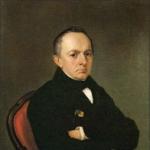The novel begins with the fact that an ordinary St. Petersburg student named Raskolnikov appears before the eyes of readers endlessly tired of the eternal acute shortage of money, living practically starving in a dirty and dull rented apartment, and the fact that his mother and sister have to support him in every possible way, sacrificing their own interests and conveniences. .
Thinking alone for a long time about the injustice of fate, Rodion decides to correct his situation by killing a certain old woman Alena Ivanovna, who lends money to people at considerable interest. In his eyes, this elderly woman is a completely useless creature, whose existence is devoid of any meaning, in his opinion, she does not bring people any benefit or joy, but, on the contrary, only without a twinge of conscience robs the poor, whom extreme need forces contact her asking for a loan.
Raskolnikov manages to convince himself that he will not do anything wrong if he kills this disgusting old woman, as he mentally calls her, that he will be able to spend the money stolen after her murder for much higher goals. The young man tells himself that he will rid the world of this useless "louse" and he has the right to such an action, since he belongs to the category of special, chosen ones, talented people who can make their way by any means.
Rodion really cracks down on the pawnbroker. Moreover, by an unfortunate coincidence, her sister Lizaveta, an absolutely harmless woman who is a little behind in her mental development, also ends up in the apartment. Raskolnikov is forced to kill Lizaveta too, the unfortunate woman does not even try to defend herself.
But after this terrible day, the young man does not at all find peace and does not become happy, as he imagined before. The young man is haunted by the fear that the investigation will accuse him of the murder, but the pangs of conscience because of what he has done are even more monstrous, his victims constantly appear before Raskolnikov’s eyes, especially the innocent Lizaveta.
Preparation for the crime and the murder itself occupy no more than a fourth of the entire content in the novel, then the author reveals in detail how Rodion suffers, becoming more and more aware of the unforgivability of his sin, more and more clearly realizing that in fact he did not kill the “old woman”, but himself yourself, your living soul. A significant role in his repentance is played by Sonya Marmeladova, who appeared in Raskolnikov's life during this period.
First, Rodion meets the girl's father, a drunken, degraded former official Marmeladov, who tells him about the tragic situation in his family. The man bitterly tells that his second wife Katerina Ivanovna is ill with consumption and she does not have long to live, her three younger children are starving and do not have elementary clothes. From Marmeladov, Raskolnikov also learns about how his eldest daughter, the quiet and meek Sonya, under pressure from her stepmother, had to embark on the shameful and humiliating path of prostitution, to receive the so-called yellow ticket.
Literally a few days later, this unfortunate man dies under the wheels, Rodion comes to his relatives and sees with his own eyes everything that Marmeladov recently told him about, making sure that a hopelessly ill woman and three children exist in hopeless poverty and despair. The only salvation from starvation for them is Sonya, who gives them all the money earned in a way that causes open condemnation and contempt in society.
When Raskolnikov begins to communicate more and more often with this timid girl, who completely sacrifices herself for the sake of those who are not even her blood relatives, he imperceptibly reconsiders his views on life. Rodion asks Sonya if she had thoughts of suicide, because her existence is simply unbearable, but the girl again answers this that in this case her family will completely disappear, and she is forced to continue this terrible life. Sonya is deeply religious, she wholeheartedly believes in God and that he will not allow at least her younger sisters to her fate, although Raskolnikov encourages her to look around and give up vain illusions.
Rodion without hesitation introduces this infinitely decent and clean, despite her occupation, girl into the society of her mother and sister, and they immediately feel affection for her, although they do not know all the circumstances. It is to Sonya that the young man nevertheless decides to confess what he has done, and the girl, although deeply shocked by his words, suggests that Raskolnikov did this only out of hopelessness, out of hunger, in order to help his mother. But to Rodion’s question about what he should do now, how to get rid of the unbearable pangs of conscience, meek Sonya firmly, without hesitation, answers that he is obliged to repent before everyone and be sure to suffer a well-deserved punishment, only then God will give him life again.
After the arrest and sentence, Raskolnikov finds himself with Sonya in Siberia, but both are ready to endure all the trials in order to truly renew their souls, atone for their sins and become different, worthy people in the future. However, in the finale of the novel, the author emphasizes that both of his heroes still have a long and difficult road to go on this path, that the true spiritual revival of Rodion and his beloved is just beginning.
And I felt terribly sad
As from an inherent sweet shadow. (By heart)
Ernest Fedorovna, the second wife of the poet, is dedicated to this poem written in 1858. Their relationship was not easy: in the early 50s, Tyutchev fell in love with E. A. Denisyeva, a young girl who answered him with selfless and passionate love. The wife knew about their relationship. Possibly out of an acute sense of bitterness, she destroyed some of her correspondence. This is a love poem. Love is one of the feelings that a person is given to experience in life. It is it that makes a person kinder, cleaner, more perfect, but also causes unbearable pain. Reading, we can say that Tyutchev is a sensitive person who is able to understand and feel.
The poem is imbued with lines in which life has stopped forever, in which love is the greatest tragedy, in which people are not afraid to express their emotions and feelings. In my opinion, these lines will always be relevant and will remain in memory.
Ticket number 18
1. The theme of degradation (spiritual fall) of a person (on the example of 2-3 stories by A.P. Chekhov).
A.P. Chekhov is one of the Russian writers who understood that money, rank, authority, power are all just external ways of enslaving the human personality. The real tool, the all-pervading tool, is fear.
Some kind of manic fear of life completely dominated the soul of Belikov, the central figure in Chekhov's story "The Man in the Case", published in 1898. Belikov is a man in a case, an absurd, insignificant creature, who, however, managed to intimidate the whole city: “We teachers were afraid of him. And even the director was afraid. Come on, our teachers are all thinking people, deeply decent, brought up on Turgenev and Shchedrin, but this man ... held the entire gymnasium in his hands for fifteen whole years. Yes, high school! The whole city!"
Belikov, according to the narrator, wore dark glasses, a sweatshirt, stuffed his ears with cotton wool, and when he got into a cab, he ordered to raise the top. What it is, a fad or Belikov's way of life, Burkin does not explain. However, he notices that this person had a constant desire to “surround himself with a shell, create for himself, so to speak, a case”, which allegedly protected him from the outside world, secluded him.
Belikov lived in constant anxiety, fearing the irritants of reality. Belikov praised the past, expressing disgust for the present, and the ancient languages that he taught were the same umbrella and galoshes where he hid from real life. And this strange man instilled fear in everyone. Those around him seemed to feel that Belikov was hiding his thought in a case: “For him, only circulars and newspaper articles were clear, in which something was forbidden.” If, for example, a circular forbade pupils to go outside after nine o'clock, this was clear and definite to him. Belikov always doubted the resolution of something and was afraid "as if something did not work out."
The atmosphere of his dwelling was added to the appearance and way of thinking. Belikov's bedroom was small, like a box, the bed was with a canopy. Going to bed, the hero covered himself with his head. But even this could not protect Belikov from the fears that haunted him, he was always afraid of everything.
One day, the director of the gymnasium came up with the idea to marry Belikov and the sister of the new teacher of geography and history Kovalenko, who, however, hated Belikov at first sight. Kovalenko could not understand how people tolerate this fiscal, "this vile mug." And this “nasty mug” also blamed the young man: he walks in an embroidered shirt, constantly on the street with some books, and then he also started a bicycle. Belikov's threats to report this whole conversation to the director brought Mikhail Savvich out of balance. Kovalenko grabbed "him from behind by the collar and shoved him." And when Belikov fell down the stairs, he saw that just at that moment Varenka (that same sister) entered with two ladies. He became a laughing stock - it's better to "break your neck, both legs."
Varenka, recognizing Belikov, could not contain her laughter: "... with this rolling, flooded "ha-ha-ha" everything ended." Belikov became very ill, and a month later he died. Like his whole life, the weather on the day of the funeral was overcast. And the hero, as in life, was in a case, which now became a coffin for him. The people who buried Belikov hid the pleasure that they got rid of the vigilant supervision of this man.
Concluding his story, Burkin expresses a deeply philosophical thought: “Isn’t it that we live in a city in close quarters, write unnecessary papers, play screw – isn’t this a case?” Case life is just existence. And Chekhov in his work always advocated a full life.
With the story “The Man in the Case”, the author wanted to say that fear of reality can imprison a person in a case he himself created. Moreover, the "case" has a clearly socio-political coloring: here Chekhov gives a brief, precise, satirical, sometimes grotesque characterization of the life of the entire Russian intelligentsia and Russia in general in the just ended reign of Alexander III.
2. The main themes in the work of Kaliningrad poets and writers (on the example of 2-3 works of the student's choice). Reading by heart a poem or a prose passage from the works of Kaliningrad writers (at the student's choice)
I know firsthand about the Kaliningrad poet Stepin Lev Vladimirovich. Recently, in the library G. H. Andersen, a meeting with this wonderful person took place. Much of what he said made a huge impression on me. But first I will share pages from the life of the poet.
Stepin L.V. was born in 1940 in the family of a border guard officer. His homeland was the city of Gelendzhik. After graduating from the Tambov Art School, he served in Belarus in rocket troops. In 1970, after graduating from the Military Institute of Physical Culture in Leningrad with a gold medal, he was assigned to the Kaliningrad VVMU, where he rose from a teacher to the head of the department. Master of Sports of the USSR. For a long time Stepin L.V. worked as a trainer at the Palace of Creativity for Children and Youth in the city of Kaliningrad. At the same time he began to work literary activity. Author of the books: “Remember forever the names of heroes”, “Russia is a heroic land”, “Heroes never die”.
The themes of the poet's poems are diverse: nature, homeland, sports, love, war.
Of all the ones I've read you can take a poem that you have chosen yourself from the collection) I would like to highlight the one in which the poet put his whole soul, love for his native land, for Russia. It is called "Russian birch".
O Russian Madonna,
I sing a hymn to you
And under your foliage
I shed tears of happiness.
You are aiming for the sky
sparkling white,
Well, how not to stroke you,
You are comparable to the princess!
You caress, you hug
Quietly shed tears
You bring coolness
And you give strength.
curly birches,
You are a balm to the Russian,
And nostalgia, dreams
What is a spiritual fall
Spiritual life is never smooth for anyone. This is a battle for freedom and not easy to win. Your opponents are very serious - they are karma, ignorance (avidya), ego and, most importantly, the Great Time, Maha-kala.
Having become a sadhu, having embarked on the Path, you must take off your rose-colored glasses and look at the reality of your Path soberly, i.e. forget about some immature glamorous ideas about an easy spiritual ascent to samadhi and siddhi, about continuous effortless soaring in the heavenly expanses. This, of course, also comes, but not to everyone and not immediately, but after many years of tapasya, after a whole life spent impeccably in self-discipline, as a sadhu.
Often the spiritual life of a beginner is one step forward, two steps back. Unfortunately.
Often, having ascended to the top of the spirit, we a short time let's get off of it. Sometimes for karmic reasons beyond our control. And sometimes that reason is ourselves. And when we ourselves are the cause, then this is already a spiritual fall, which can be forestalled and prevented if we are a little vigilant.
Spiritual fall is a lowering by the soul of its level of light, its wisdom and energy. This is an immersion in impure, obscured, dense states of tamas or rajas.
For a non-sadhu, a non-practicing person, there are no spiritual falls, since there is no ascent, no ascent, he simply does not set himself the goal of rising to the shining heights of liberation, so there is nowhere to fall. But for him there is the concept of "sin" (papas), when he does something that greatly worsens his karma and gives a negative karmic reaction (karmaphala).
For sadhus, in addition to sin, there is also the concept of "spiritual fall", i.e. lowering one's spiritual level, the level of prana and consciousness due to any mistakes on the Path. Spiritual fall is not a moral category, not a sin in the social sense or in the sense of karmic retribution, no one, no masters of karma will punish or scold you for it. For your spiritual fall, you are not responsible to anyone except yourself and God. This is not a social concept, but a purely spiritual one. The yogi in the event of a fall punishes himself by depriving himself of the attained level in samadhi, the possibilities of liberation, the siddhis, or the blessings of the gods and saints.
Causes of falls
Spiritual falls happen for several reasons:
due to committing violence against someone, that is, violating ahimsa,
by committing evil acts, such as stealing, showing anger, drinking alcohol, using drugs,
because of the eruption of curses on the heads of others,
due to black magic
due to thoughtless falling into worldly sensual pleasures and pastimes, falling into "maya",
due to misuse of sexual energy, loss of sexual energy, such as loss of energy through unconscious sex, orgasm, sexual relations at the wrong time, in a holy place, with an impure person, or entering into such a relationship when the spiritual obligations of a brahmacharya are taken for some time or for life (in the case of hermits, ascetic monks, for example, as in the story of the ascetic Kashyapa and the Apsara Alambusha),
due to gambling
due to violation of the spiritual rules of behavior, communication and relations with the objects of Refuge (samay),
because of offending (aparadha) sadhus, saints, teachers or gods and objects, refuge, showing disrespect or challenging them, and it doesn’t matter one’s own or others, although in the case of one’s own karmic reactions are stronger,
by causing disharmony in the spiritual family or sangha,
due to the disciple's conflicts with his guru or godbrothers (guru-bhayas),
because of soul-tormenting doubts about the chosen Path, disbelief in it, after the initiation took place,
because of impure thoughts cherished for a long time,
due to the influence of bad planets in the horoscope,
due to falling into laziness, inattention, weakening diligence in daily sadhana at a stage when effortlessness and spontaneous sahja samadhi have not yet been achieved,
due to obstacles from the impure thoughts of other people,
because of the disclosure, transmission of secret teachings, methods, mantras, "unsuitable vessels", i.e. people who do not have faith, purity and proper understanding,
because of divulging your sublime experiences to the wrong people or you are at the wrong time,
because of eating food prepared by sinful people,
due to the long stay of the sadhu in the "wrong company", i.e. among people who have a gross, clouded vision of the world, Dharma, the Way of the saints,
because of insults to foreign religions and teachings,
a renunciate monk can commit a spiritual fall due to being engrossed in worldly affairs,
lay grhastha, karma sannyasi - due to conflict in family relationships.
Signs
Signs indicating a fall may be different. With siddhas, siddhis disappear. Experienced sadhus lose the ability to enter samadhi. Light disappears in samadhi. The sound of anahata-nada disappears. Kundalini descends from ajna or sahasrara down to the lower chakras, awakening gross desires. Mindfulness in empty dreams and dreams goes away. Those who have always easily communicated with the gods lose their connection with the gods. Dreams arise where you go down, you enter the cellars. In beginners, gross worldly desires awaken with renewed vigor, indifference or disrespect for sadhana, Dharma and saints appears. In the worst case, a person commits bad actions with the body, speech or mind. Inspiration, faith, experience in meditation worsens or disappears, impure dreams appear in dreams or impure spirits come.
The appearance of such signs is not a reason to fall into a feeling of despondency, guilt, self-abasement, self-flagellation, depression, sprinkling ashes on the head. This is a reason to pull yourself together and fix what needs to be fixed. The main thing to remember, saints, God sympathizes with us, blesses and loves us, even when we go astray. God, saints, gods - this is not justice, this is compassion, love and mercy. So, whether we fell or not, we are still under their protection.
Avoid falls along the way
But how to avoid falling on the Path?
It's not as difficult as it sounds if you understand the process. You need to be a spiritual warrior, impeccable, vigilant and attentive daily, hourly, every second.
Faith, devotion, knowledge of the teachings and discrimination (viveka) of what is the Way (dharma) and what is not the Way (a-dharma), what is the Truth (sat) and what is not the truth (a -sat), mindfulness, purity and awareness - best defense from any fall.
Triple Protection
In our tradition, there are three ways to protect against spiritual downfalls.
It is self-discipline, a devoted heart, and awareness. Mindfulness and thoroughness (avadhana) and the spirit of pure vision (shuddha-drishti), "one taste" (samarsya).
The first way belongs to sutra, the second to tantra, and the third to anuttara tantra.
A wise sadhu avoids falling down even in small things. On the one hand, he is very attentive, prudent and accurate in observing the commandments, obligations, thoughts, speeches and deeds, always and everywhere, especially with regard to relations with the sacred objects of Refuge for sadhus - devatas, gurus, sangha, guru-bhayami, sadhu.
On the other hand, he nurtures, cultivates his faith, devotion, guru yoga, Refuge (sharanam), honors samaya, maintains pure vision, respects the divinity in every being.
On the third side, he dwells in the contemplation of the spirit of non-duality, the single taste of all phenomena, i.e. in the "one samay", which in itself is the best protector against all falls.
From the Satsang of Sri Guru Swami Vishnudevananda Giri




















